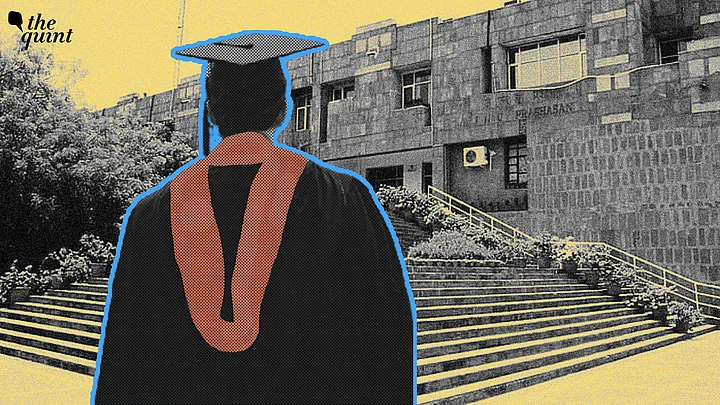After chaos over the Common University Entrance Test (CUET) for undergraduate courses, the National Testing Agency's (NTA) delay in conducting the CUET for PhD has left numerous universities in the lurch over admissions.
The Jawaharlal Nehru University Teachers' Association (JNUTA) held a press conference on 12 September to address the issues faced due to CUET.
At the press conference, several JNU professors said that they don't know what to do since earlier they used to admit students through the JNU Entrance Examination (JNUEE).
Apart from JNU, there are 18 other universities such as Pondicherry University and Hyderabad Central University who have agreed to conduct PhD admissions through CUET PhD.
Sucharita Sen, Secretary of JNUTA, told The Quint that the admission process generally begins in May and classes start by August. Due to the delays and uncertainty, however, the current batch is likely to start as late as January 2023.
How Were PhD Admissions Conducted Earlier?
Surajit Mazumdar, Professor at the Centre for Economic Studies and Planning, said that JNU used to conduct a national-level test for all its courses. The earlier test would be conducted across the country in 40 centres with many teachers and invigilators being part of the process.
The test would comprise a viva-voce and a written test. The viva voce would make up 30 percent of the result and the written test would make up 70 percent of the result.
He said, “Because it was mandated that we must admit the best talent across the country, we would conduct our own test. In 2018, the NTA started conducting a Multiple-Choice Question (MCQ) paper for admissions. However, the test would still be set by the department. In the subsequent year, the test was administered completely by the NTA. And earlier this year, CUET was implemented.”
There was no proper deliberation on whether the NTA will conduct JNUEE or CUET for PhD admissions. And even till today, we do not know which test is going to be followed.Surajit Mazumdar, JNU Professor
Avinash Kumar, Professor at the School of Informal Sector and Labour Studies, said, “Back when Jagadesh Kumar Mamidala was the Vice-Chancellor, it was brought on the agenda of the academic council meeting."
He added that there was a lack of clarity on how it will be interdisciplinary since each centre has its own diverse patterns.
In 2021, an announcement regarding CUET implementation was made by the former V-C, who is now heading the University Grants Commission.
“Academic Calendar Pushed Behind Severely”
While the NTA has made no such announcement, Sucharita Sen claimed that "NTA informed us that it will not be able to conduct CUET PhD." She said, “If we have to hold another exam in place of CUET, the entire process would take at least three months. This means that one semester is lost, or we might even be looking at a zero year.”
She said that this is leading to a ‘national waste of resources.’ She added, “The delay leads to staggered semesters which puts pressure on professors, and they have to cut short the syllabus.”
A statement issued by the JNUTA earlier, read, “The fate of a JNU-specific JNUEE, which NTA has been conducting for the past three years is yet officially unknown, but it is a fact that despite the e-prospectus having been released on 24 August 2022, the NTA is yet to generate a weblink to initiate the process of inviting applications for the PhD JNUEE.”
“MCQ Tests Are Not Conducive,” JNU Professors
In addition to the issues regarding PhD admissions, professors have also spoken about how MCQs are not conducive to diversity, be it undergraduate, postgraduate, or research programmes.
JNU Professor Rama V Baru of Centre of Social Medicine and Community Health said, “We have centres that are interdisciplinary in nature. One such instance is our centre which offers a programme in Public Health which is unique because it is located in the School of Social Sciences.”
“The MCQ format for Master's and PhD programmes in centres like ours, restricts our ability to assess domain knowledge that includes many disciplines, knowledge based on practical experience and the ability to read and write.”Rama V Baru, JNU Professor
Similarly, Professor Avinash Kumar said that the NTA had planned to conduct the same test for MA in Development and Labour, and Social Work. He said, “MA in Social Work is more action-based while development and labour is more discipline-oriented. They said that both the courses have a similar syllabus. But tests cannot be clubbed like that."
The issue was then brought up with the V-C, who then ensured that the two tests are conducted separately.
The academic calendar for undergraduate and postgraduate courses, have been set behind significantly too, said Professor Sen. The monsoon semester which would have 18 weeks is now going to last approximately 10-12 weeks and the Winter semester which would have spanned across 18 weeks will have to be truncated to a 6-12 week semester. The Quint reached out to NTA Chairperson, Vineet Joshi, who did not respond to queries on the same.
